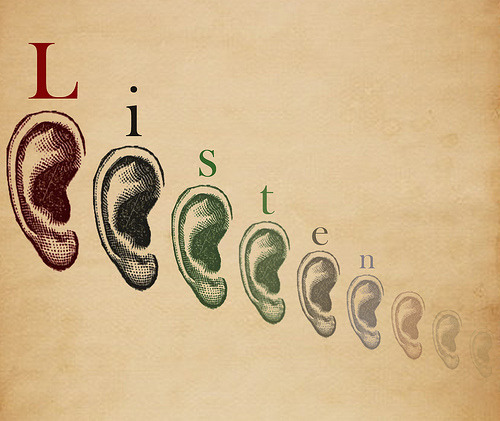
The way you listen is telling, a compass that points to the true focus of your attention. For good listeners, that needle points to the person talking. For bad listeners, that needle points to themselves.
The thing is that it’s really obvious. Great listening requires you to show that it’s happening, and that it’s happening sincerely. Much of that sincere communication comes down to lighting up to show “message received”. Instead, some people fall into a bad habit of putting on a show of listening, mumbling sounds of non-contextual agreement, or interrupting with “yes, but —”, or pretending to be attentive but mishearing everything.
Listening isn’t simply waiting for your turn to say something or show off your brilliance but engaging with what’s being said, building on it, reacting with thoughts and emotions, and showing that you understand or want to know more.
While the art of listening is touted in business, it’s rarely practiced. Bad listening is bad business, and here’s why:
1. Bad listening is dismissive and ultimately disengaging.
Bad listening affects how we feel about ourselves, eventually reaching into how we feel about our existence. You know that philosophical question, “If a tree falls in the forest and nobody’s around to hear it, does it make a sound?” Well, have you ever provided some insightful input at a meeting, toiled to reply to an email asking for opinions with a worthwhile response, or done something pretty great — only to be met with nary a ripple?
If nobody’s actually listening to me, then why am I here?
People who feel unheard and undervalued will understandably disengage and suffer negative impacts on their stress and wellbeing.
2. Bad listening leads to inferior information and decisions.
When you don’t take care to listen and pay attention to the people around you, you miss out on crucial information. This is especially important for managers and bosses to consider. Research by NYU Stern’s Kelly A. See confirms what many employees already know: people with more power listen less, take less advice, and are ultimately less accurate in final judgments.

In contrast, Intel’s Andy Grove understood that his position of managerial power affected his ability to make good decisions. So he chose to spend most of his time gathering information by staying out in the open, signaling that he was ready to listen. He understood that information-gathering is “the basis of all other managerial work,” and that ultimately, “your decision-making depends finally on how well you comprehend the facts and issues facing your business.”
See’s studies identifies “confidence in one’s judgment” as the reason behind the inverse relationship between power and listening skill. Powerful people are confident; their reaction is to stop listening. Keys to listening well, then, are openness and vulnerability, pointing the compass needle away from yourself and showing confidence in others.
3. Bad listening is a waste of time.
If bad listening leads to misunderstanding, disengagement, and poorer decision-making, that means more time is required to arrive at accurate information, good decisions, and a righted course.
There’s one kind of behavior in particular that is often overlooked as a form of bad listening — too many unmindful managerial interruptions. An obvious example is how meetings are a breeding ground for bad listening and inefficiency. But there are also more casual intrusions.
In astute answers to a question posed by Inc. to successful entrepreneurs to identify their biggest time wasters, Katia Beauchamp, co-founder of Birchbox, said, “Randomly bugging my team with questions about yesterday, today, six months from now.” Ben Lerer, CEO of Thrillist, responded with, “Checking in with the product team to look at work they’re doing that isn’t ready for me to see yet.”
In failing to respect your team’s schedule or space, you’re not listening to their needs or giving them a chance to formulate their contribution to the conversation. It’s an easy trap for managers to fall into, but it’s the kind of listening that points right back at yourself, making the information-gathering about you rather the team or the project at hand.
How to Become a Better Listener.

Admit that you’re not a great listener
Think everyone else around you is not good at listening but that you’re great? That’s called a delusion. Most of us could use some improvement in our overall listening skills, or in equalizing how well we listen in different spheres of our life. The first step is to recognize that everybody, including you, could use some practice.
Practice focusing
If you’ve ever gone to a place where all the people speak a foreign language that you’re trying to learn, you know how listening can take a lot of energy and focus. Without it, the words wash over you as a blanket of meaningless sound.
You have to see conversations as real exchanges, expanding your full attention on the other person in order to gain all the verbal and nonverbal cues to what she or he’s saying. That kind of focus is impossible to do while fiddling around on your phone. Practice bringing that type of watchful focus, attention, and engagement to more of your conversations.
Acknowledge and respect
Good listening signals the broader messages of respect and trust.
Acknowledge people and their work by giving rich, frequent feedback that’s broader than corrective criticism. Without encountering a supportive voice at the end of the line, people will simply disconnect.
Stop telling people what to do, and instead, ask for and consider people’s opinions. Learn the best way to get something done by listening rather than assuming.
Finally, be mindful of others’ listening schedules and rhythms. Interrupting people at random, unexpected moments co-opts their time and attention. While information-gathering is important, doing so in a respectful way ensures that you help more than you hurt.
If people feel like they are only there to be corrected, directed, and interrupted, they’ll lose vital autonomy and motivation. More important than the business case, though, is to remember that good listening and giving quality attention is just not about you. Listening is how you build trust, knowledge, connections, and relationships. And that’s about all of us.
Liked this post? Subscribe to our free newsletter to stay up to date with more great content on how to work better!
Image: [1]: Daniela Vladimirova; [2] opensourceway; [3]: ky_olsen.
